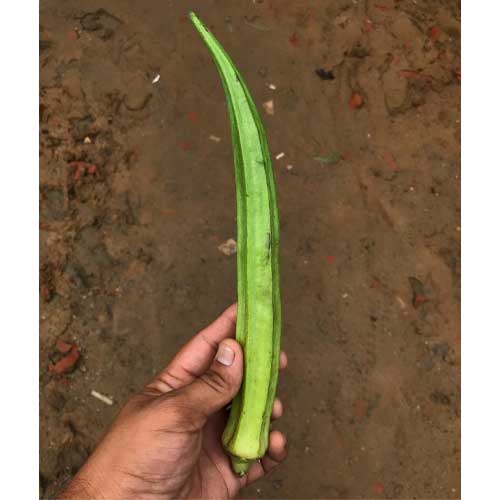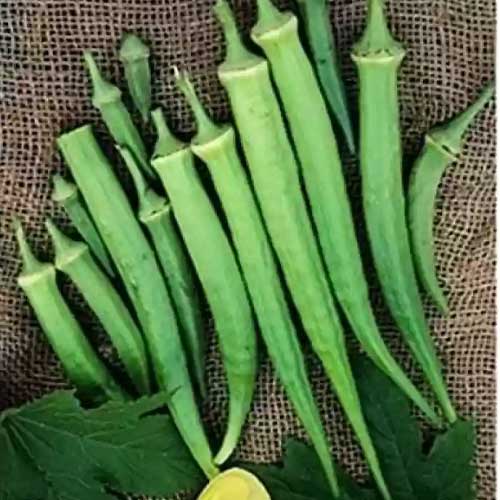Total Number of seeds: 50
Ladies Finger Bhindi Extra Long Seeds
Ladies Finger Bhindi Extra Long Seeds are a high-yielding variety that produces light green pods growing up to 12 to 15 inches long. These seeds are open-pollinated and native, known for their excellent yield and taste. With a duration of 120 days, they are perfect for home gardens and farming.
About This Item
- Type of Seeds: Open Pollinated, Native Seeds
- Germination Time: 7-14 days
- Hours of Sunlight: 6-8 hours of sunlight daily
- Where to Grow: Suitable for gardens or large pots
- Growing Season: Best planted in early spring or late summer
- Seeds Sowing Depth: 1/2 inch deep
- Ideal Climate: Warm to hot climates
- Plant Height: 4-6 feet tall
- Organic Fertilizer Requirement: Apply every 3 weeks
- Life Span: Annual
- Ideal Growing Temperature: 20-35°C
- Harvesting Time: Ready for harvest 120 days after sowing
- Maintenance Required: Regular watering and light pruning
- Watering Frequency: Keep soil moist but avoid waterlogging
- Ideal Grow Bag Size: 18-20 inches wide


What Size Grow Bag is Best for Ladies Finger
Growing Season in India
The best time to grow Ladies Finger Bhindi Extra Long Seeds in India is from February to March or June to August. Warm temperatures and sunny days during these months help ensure a healthy crop.
How to Grow in Pots
To grow these seeds in pots, choose a pot with drainage that is 18-20 inches wide. Sow the seeds 1/2 inch deep in nutrient-rich soil, and place the pot in an area with 6-8 hours of sunlight daily. Water regularly, and your plants will thrive.
Seeds Sowing Method
- Preparation: Use nutrient-rich, well-drained soil.
- Sowing: Sow seeds 1/2 inch deep, spaced 18-24 inches apart.
- Watering: Water gently and regularly to keep the soil moist.
- Germination: Seeds will sprout within 7-14 days.
- Transplanting: Transplant seedlings when they reach 4-6 inches tall.
Plant Care Tips For Ladies Finger Bhindi Extra Long Seeds
- Sunlight: Ensure 6-8 hours of sunlight daily.
- Soil: Use well-drained, nutrient-rich soil.
- Fertilization: Apply organic fertilizer every 3 weeks.
- Pruning: Lightly prune the plants to encourage airflow.
- Support and Spacing: Ensure plants have enough space to grow freely.
- Pest Control: Watch out for aphids and use organic treatments if necessary.
- Disease Prevention: Avoid wetting leaves to prevent fungal diseases.
How to Fertilize Vegetable Plants Effectively
1. Apply Nutrient-Rich Fertilizers
When your plants begin flowering, use nutrient-rich fertilizers like Organic Bone Meal Powder or Vermicompost. This helps in boosting the bloom and enhances overall yield.
2. Use Organic Fertilizers
Feed your plants with organic fertilizers such as Cow Dung Manure or Neem Cake. Organic options promote healthy soil life.
3. Regular Feeding
Apply fertilizers every 20-25 days to ensure plants receive a steady supply of nutrients. Choose from various options like Cocopeat Compost for moisture retention.
Special Features
This variety of Ladies Finger is known for its extra-long pods that stay tender even when fully mature. It's a prolific yielder, perfect for home gardens and commercial farming.
Benefits/Uses
These long, tender pods are perfect for cooking in various dishes such as stir-fries, curries, and soups. The high yield ensures a steady supply of fresh vegetables for your kitchen.
Precautions While Growing
- Watering: Ensure regular watering without making the soil too wet.
- Support: Light support may be needed as the plants grow tall.
- Pests: Regularly check for pests and treat them organically.
Common Problems Affecting Plants and Solutions
- Blight: Ensure proper air circulation and avoid getting the leaves wet when watering.
- Pests: Use organic sprays like neem oil to control aphids or other pests.
- Fruit Rot: Make sure to maintain even moisture to prevent fruit rot.


Anita
Plants ka shape balanced lag raha hai and growth natural pace me ho rahi hai.
Sreenath K
Roots strong hold kar rahe hain, sprouting uniform tha. Quality kaafi acchi lagi.
Bindu
Growth stable hai, leaves healthy and bright dikh rahe hain.
Lokesh M
Seedlings strong and well formed aaye. Early stage development impressive hai.
Meena
Seedlings healthy aaye, plant growth steady hai. Looking forward to long pods.
Sathish K
Plants well rooted lag rahe hain aur early growth strong dikh raha hai.
Rohini
Sprouts stable aaye aur leaf formation neat thi. Bhindi ke results ka wait.
Geetha
Germination achha tha, seedlings thick aaye aur growth smooth ho rahi hai.
Manoj K
Fresh sprouts mile, early growth strong lag rahi hai and plant height bhi improve ho raha hai.
Farida
Leaf quality good hai, seedlings strong grow kar rahe hain. Excited for final yield.